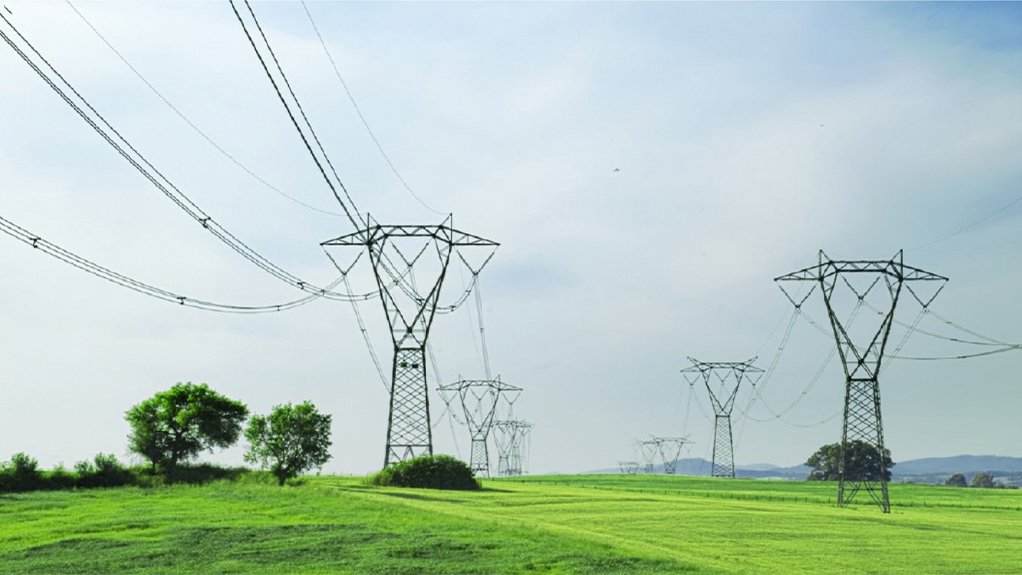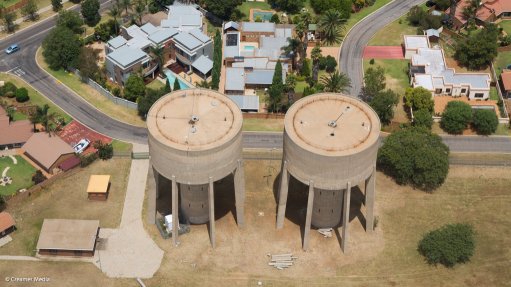Business leaders speak on South Africa’s current energy transition priorities
Engineering News & Mining Weekly has canvassed business leaders for their opinions on the priorities for South Africa’s electricity sector, as well as what role the Energy Council of South Africa should play in helping the country and business navigate the unfolding energy transition.
Below you can read the contributions of the of the following thought leaders: Absa Business Banking’s Rashveer Manilal, African Clean Energy Developments & Energy Infrastructure Management Services' Yaseen Mahomed, Air Liquide's Lasad Jaouani, Etana Energy's Evan Rice, Mulilo's Jan Fourie, Nedbank CIB's Dhireshni Chowthee, Red Rocket's Matteo Brambilla, Seriti Green's Peter Venn, Siemens Energy's Thabo Molekoa and Standard Bank South Africa's Deerosh Maharaj.
Absa Business Banking
Rashveer Manilal
Renewable Energy Sector Head
South Africa’s biggest energy challenge lies in its reliance on ageing, coal-based infrastructure, which is environmentally unsustainable. The rising cost of electricity and energy outages continue to undermine economic productivity, investor confidence and the daily lives of millions. At the same time, regulatory complexity and grid constraints hinder rapid adoption of alternative solutions.
Within this challenge lies South Africa’s greatest energy opportunity; a fast, just transition to renewables. With abundant solar and wind resources, the country is uniquely positioned to lead the continent in clean energy.
Additionally, given our country’s unique challenges, we consider gas to be an important transition fuel and we support the development of gas infrastructure, including gas-to-power plants, as it is a cleaner fuel source than coal and/or diesel and can support the build-out of renewable energy by providing baseload supply or hybrid options.
Investing in decentralised generation, along with battery storage and grid modernisation, will not only stabilise supply — particularly for businesses and communities vulnerable to outages – but also stimulate local manufacturing, energy reliance and job creation within the green economy, which includes sectors such as renewable energy.
At Absa Business Banking, we see energy security as both a national imperative and a catalyst for inclusive growth. Renewable energy is cheaper and cleaner than traditional coal-powered energy. That’s why we are actively supporting our clients in financing embedded generation, energy efficiency upgrades and sustainable infrastructure.
Over the past ten years, Absa has been a leading financier in renewable-energy installations across the country, in both the commercial and the utility-scale space. We also offer advisory support to help businesses navigate regulatory requirements and unlock the benefits of green investment.
By aligning our financing solutions with South Africa’s climate and development goals, we’re helping to build a more resilient, low-carbon economy – one powered by innovation.
African Clean Energy Developments & Energy Infrastructure Management Services
Yaseen Mahomed
Head of Business Development
South Africa’s biggest energy challenge is its reliance on an ageing, coal-heavy utility fleet and a constrained national grid. To ensure a just transition, we must urgently add reliable, clean capacity that balances social and environmental priorities.
This challenge presents a major opportunity: unlocking South Africa’s world-class renewable resources through innovative business models and grid expansion. By attracting private capital, diversifying offtake markets and accelerating decarbonisation, we can drive sustainable development.
The rise of commercial and industrial procurement, alongside the REIPPPP, is already boosting investment, energy security and industrial competitiveness. The upcoming South African Wholesale Electricity Market will further liberalise the sector, enabling transparent, competitive private-sector participation.
African Clean Energy Developments, together with Energy Infrastructure Management Services, is proud to be pioneering this transition.
Since 2008, we have developed well over 2 GW of renewable projects across wind, solar PV and hydropower, with over 1 000 MW now operational and over 500 MW under construction.
We were the first independent power producer to deliver a wind project in the REIPPPP – the grid-connected 72 MW Msenge Emoyeni private wind farm for Sasol. We were also the first to close a wind farm with a renewable-energy trader NOA Group Trading, through the 144 MW Ishwati Emoyeni project.
Our vision is to reshape South Africa’s energy future by combining technical and transactional expertise with innovative partnerships and operational excellence.
Air Liquide
Lasad Jaouani
Africa, Middle East and India Industrial Direction & Secunda Operations VP
Accelerating the expansion and modernisation of South Africa’s national transmission grid is a critical priority and we fully support the collaborative work being driven by the Energy Council of South Africa to achieve this.
The coordinated focus is essential for unlocking the country’s greatest energy opportunity: a private sector-led transition to a resilient, renewable-powered energy system. By enabling more renewable capacity to connect to the grid, we can directly enhance the country’s energy security and advance the decarbonisation of the industrial sector.
The country is at a pivotal moment where supportive policy and industry are converging to unlock massive investment in solar and wind resources. This transition presents a powerful dual benefit. Firstly, it helps to resolve the energy deficit by rapidly deploying new generation capacity, and secondly, it drives the economy’s long-term decarbonisation.
This creates a foundation for sustainable growth and enhanced industrial competitiveness, positioning South Africa as a potential leader in the green economy.
At Air Liquide, sustainability is at the heart of our business strategy.
Accordingly, together with our partner Sasol, we are proud to be the largest private offtaker of renewable energy in the country. In August, the Damlaagte PV Facility started commercial operations, supplying 97.5 MW of renewable power directly to the Secunda site, home to Air Liquide’s operations that support Sasol’s synthetic fuels and chemicals operations.
This project is the first to supply renewable power under our joint procurement programme through which we have already secured almost 700 MW of renewable energy.
From this programme, Air Liquide will be allocated 400 MW which is projected to reduce CO2 emissions of the units we operate by about 1.2-million tonnes a year, contributing directly to our goal of decreasing CO2 emissions associated with oxygen production in Secunda by about 30% to 40% by 2031.
Through our direct actions and collaboration within the Energy Council of South Africa, we are contributing to unlocking a sustainable energy future for the country.
Etana Energy
Evan Rice
CEO
Stakeholders in South Africa’s electricity supply industry are working hard to solve for the shared objectives of energy security, affordability, emissions reduction and socioeconomic prosperity.
Currently, the most pressing challenges are financing and building the new grid and generation capacity required to grow our economy, as our ageing coal fleet undergoes phased decommissioning. National Treasury and Eskom simply cannot afford to fund this alone.
Yet within this challenge lies our greatest opportunity: unlocking South Africa’s world-class renewable-energy resources on the back of private-sector electricity demand.
The private sector has already demonstrated its ability to mobilise capital and deploy capacity, with several gigawatts being built and operated by IPPs with private offtakers – initially through bilateral agreements, but more recently, with energy traders as the counterparty.
By aggregating demand, traders can significantly broaden the pool of business customers while mitigating risk for customers and generators. These benefits will be further enhanced with the launch of the SAWEM next year.
Amid these developments, Etana Energy is playing its part. As a licensed, majority black-owned trader, we provide businesses with clean, cost-competitive power through the grid from our diversified wind and solar portfolio.
Mulilo
Jan Fourie
CEO
South Africa’s energy sector is at a pivotal point in history. While we continue to face challenges, such as ageing infrastructure, constrained grid capacity and meeting climate goals, we also have a powerful opportunity to reshape our energy future into one that is sustainable, resilient and proudly South African.
At Mulilo, we believe the pathway forward is through a diversified energy mix, with renewable energy at its core – complemented by coal, gas and nuclear in balance.
As an IPP we see our role as central to this transformation: bringing innovation, agility and investment into the sector.
By fast-tracking the development of wind, solar and battery storage solutions, we can reduce reliance on fossil fuels, enhance security of supply and unlock inclusive growth.
But technology alone is not enough. Streamlined regulation, expanded grid infrastructure and strong public-private collaboration – through platforms such as the Energy Council of South Africa – are essential.
In the foreseeable future, we envision a more dynamic energy trading environment, with several IPPs – including Mulilo – managing substantial portfolios of 5 GW or more. We also aspire to see a growing pool of renewable-energy professionals, supported by enhanced, industry-specific education, training, and development opportunities for South Africa’s youth.
Nedbank Corporate and Investment Banking
Dhireshni Chowthee
Power and Renewables Finance Principal
South Africa’s energy sector is undergoing a gradual, sustainable transition, with human, economic and environmental implications. The rise of renewables is reshaping power generation, offering a pathway to greater energy security, affordability and sustainability.
But to realise this potential, we must modernise and expand the grid to unlock clean energy access. The stakes are high, and today’s choices will shape the lives, economy and environment of future generations.
Our world-class renewable-energy potential, dynamic private sector and policy momentum behind reforms – such as the wholesale electricity market scheduled to launch in 2026 – provide a strong foundation for this shift to work.
However, reaching its full potential requires investment in large-scale renewable-energy generation, embedded power solutions and the infrastructure that connects them, all of which are key to a just transition that creates jobs, lowers emissions and ensures inclusive energy access.
As a member of the Energy Council of South Africa, Nedbank CIB supports initiatives such as Energise Mzansi and Energy Data and Modelling South Africa through financing and data-driven policy engagement.
By the end of 2024, we supported over R183-billion in sustainable development finance, representing 19% of total lending, with a target of 20% by 2025. We have already committed more than R50-billion to the Renewable Energy Independent Power Producer Procurement Programme and continue to grow embedded generation financing. Our Energy Policy aligns with the Paris Agreement and sets pathways to exit fossil fuel financing by 2045.
A sustainable future requires collective action. As a bank, we are playing our part by channelling capital into solutions that strengthen energy security and support a sustainable energy future.
Red Rocket
Matteo Brambilla
CEO
South Africa requires reliable and innovative energy solutions, and our role as a leading independent power producer has never been more critical. That is why we are committed to delivering projects that address today’s challenges while creating a lasting impact for generations to come.
As a proud member of the Energy Council of South Africa, Red Rocket stands at the forefront of advancing the country’s energy transition, driving a greener, more sustainable future.
Our mission is demonstrated through our successes in the Renewable Energy Independent Power Producer Procurement Programme (REIPPPP) and the growing commercial and industrial market. Our ground-breaking projects have set new benchmarks across the country and the continent.
Among these is our 400 MW Overberg Wind Farm – South Africa’s largest commercially developed wind project – reaching financial close, alongside delivering the first two projects under the REIPPPP’s Bid Window 5 to reach commercial operation: The Brandvalley and Rietkloof wind farms, each with a 144 MW nameplate capacity.
Our Virginia Solar Park, at 275 MWp, was ranked as South Africa’s largest grid-connected solar project at the start of its construction in 2024. Meanwhile, our Wolf Wind Farm, under construction, is the first in Africa to deploy Vestas V163-4.5MW turbines.
Brandvalley and Rietkloof also feature automated shutdown-on-demand technology, developed with Bioseco, to mitigate bird collisions. Wolf, Witberg and Overberg wind farms will also feature this technology.
More recently, Red Rocket was awarded three solar projects as part of Bid Window 7, amounting to a nameplate capacity of 655.5 MW.
Red Rocket remains committed to shaping an energy-resilient South Africa. As we power industries and communities, we also drive inclusive growth and environmental, social, and governance stewardship as key pillars of our energy transformation.
Seriti Green
Peter Venn
CEO
South Africa’s energy system is under immense pressure, with over 70% of electricity still generated from coal and frequent loadshedding undermining growth. The just energy transition (JET) is not optional, it is the pathway to securing affordable, sustainable power while protecting jobs and unlocking economic opportunity.
Seriti is leading this transition through the Ummbila Emoyeni wind project in Mpumalanga, which will deliver 900 MW of renewable capacity, starting with three 155 MW phases by 2027. It is not only the largest JET project in South Africa, but also the biggest infrastructure investment in Mpumalanga.
Electricity Minister Dr Kgosientsho Ramokgopa, visiting the site in August 2025, called it “a perfect illustration of the best of the renewables sector”.
He added that, “energy leads, and the rest follows. It must be affordable, and the mix must be right. Ummbila Emoyeni shows that the [JET] is not only possible, but that it belongs right here in Mpumalanga”.
The project embodies Seriti’s strategy of “coal and renewables” working together. Seriti remains committed to coal, while Seriti Green adds renewables to decarbonise mining, support State-owned electricity utility Eskom and strengthen energy security.
With over 17 000 job seekers registered on the Seriti Green Skills Portal, and R385-million earmarked for small and medium-sized enterprises and social development, the economic uplift will be far-reaching.
Seriti Green is proving that JET is not an abstract policy, it is jobs, infrastructure, community development and investment in action.
Siemens Energy Southern & Eastern Africa
Thabo Molekoa
Managing Director
South Africa’s energy system is in a critical phase of transition – one that presents both risks and opportunities. While the immediate pressures of loadshedding may have eased, deep-rooted challenges remain. Ageing coal plants and limited grid capacity present ongoing challenges to ensuring long-term energy security and affordability.
At the same time, recent momentum in renewable-energy investment and transmission reform signals a pathway toward a more reliable, diversified and sustainable energy future.
The opportunity before us is significant. With vast renewable resources, complemented by hydrogen-ready gas-to-power and storage solutions and underpinned by critical grid development, South Africa can build an energy mix that is not only more secure but also significantly lower in carbon intensity and societal cost.
A reliable and affordable energy supply is the backbone of a modern industrial economy, the foundation for inclusive growth and a prerequisite for sustained investment.
Siemens Energy is committed to being a long-term partner in this transformation. We bring proven technologies across gas, grid and renewables, while advancing local partnerships to strengthen South Africa’s energy sector.
Our Wadeville Manufacturing and Service facility drives localisation, and our Power Academy can train over 450 people a year in power plant automation and related technical skills – building the capabilities needed for the future.
With decisive action today, South Africa can build an energy system that powers industry, empowers communities and creates jobs.
Standard Bank South Africa
Deerosh Maharaj
Energy, Infrastructure & Mining Executive Head
While South Africa’s swiftly evolving energy landscape has various challenges, we are also blessed with certain boons, which we can leverage to transform our power sector into a globally-leading, digitally-effective power grid and supply chain.
South Africa’s lack of surplus, affordable power – required to fuel economic growth – is a prominent challenge, with the majority of the country’s challenges being systemic and interlinked.
Our ageing and poorly maintained centralised infrastructure are the main contributors to the unreliable electricity supply and hyperinflated costs.
Additionally, the emerging distributed energy sector has low barriers to entry. As a result, while a few credible solution providers are driving the correct agendas, a significant number of less reliable providers are damaging the sector’s reputation, predominantly in the SME, commercial and industrial market segments.
This is compounded by many consumers’ limited understanding of the important variables involved when considering power solutions and sustainability.
Becoming a globally-leading power sector requires close integration and collaboration across the value chain of regulators, generators, consumers and solution providers, alongside the mobilisation of capital to support the transition and growth of the sector efficiently.
The sector should have the capability and agility to enable, and scale in line with, economic growth, while generating power through sustainable sources.
Achieving this requires infrastructure supported by sturdy digital platforms and an extensive digital network to meet seamless transactional and operation and maintenance requirements.
South Africa has some of the brightest and forward-thinking minds in the world, with associations, focus groups and corporations, including Standard Bank, proactively driving the correct themes. Global drivers are also moving us in the correct direction.
If we address challenges swiftly and use our strengths, we can make significant leaps in the sector.
Article Enquiry
Email Article
Save Article
Feedback
To advertise email advertising@creamermedia.co.za or click here
Press Office
Announcements
What's On
Subscribe to improve your user experience...
Option 1 (equivalent of R125 a month):
Receive a weekly copy of Creamer Media's Engineering News & Mining Weekly magazine
(print copy for those in South Africa and e-magazine for those outside of South Africa)
Receive daily email newsletters
Access to full search results
Access archive of magazine back copies
Access to Projects in Progress
Access to ONE Research Report of your choice in PDF format
Option 2 (equivalent of R375 a month):
All benefits from Option 1
PLUS
Access to Creamer Media's Research Channel Africa for ALL Research Reports, in PDF format, on various industrial and mining sectors
including Electricity; Water; Energy Transition; Hydrogen; Roads, Rail and Ports; Coal; Gold; Platinum; Battery Metals; etc.
Already a subscriber?
Forgotten your password?
Receive weekly copy of Creamer Media's Engineering News & Mining Weekly magazine (print copy for those in South Africa and e-magazine for those outside of South Africa)
➕
Recieve daily email newsletters
➕
Access to full search results
➕
Access archive of magazine back copies
➕
Access to Projects in Progress
➕
Access to ONE Research Report of your choice in PDF format
RESEARCH CHANNEL AFRICA
R4500 (equivalent of R375 a month)
SUBSCRIBEAll benefits from Option 1
➕
Access to Creamer Media's Research Channel Africa for ALL Research Reports on various industrial and mining sectors, in PDF format, including on:
Electricity
➕
Water
➕
Energy Transition
➕
Hydrogen
➕
Roads, Rail and Ports
➕
Coal
➕
Gold
➕
Platinum
➕
Battery Metals
➕
etc.
Receive all benefits from Option 1 or Option 2 delivered to numerous people at your company
➕
Multiple User names and Passwords for simultaneous log-ins
➕
Intranet integration access to all in your organisation





















